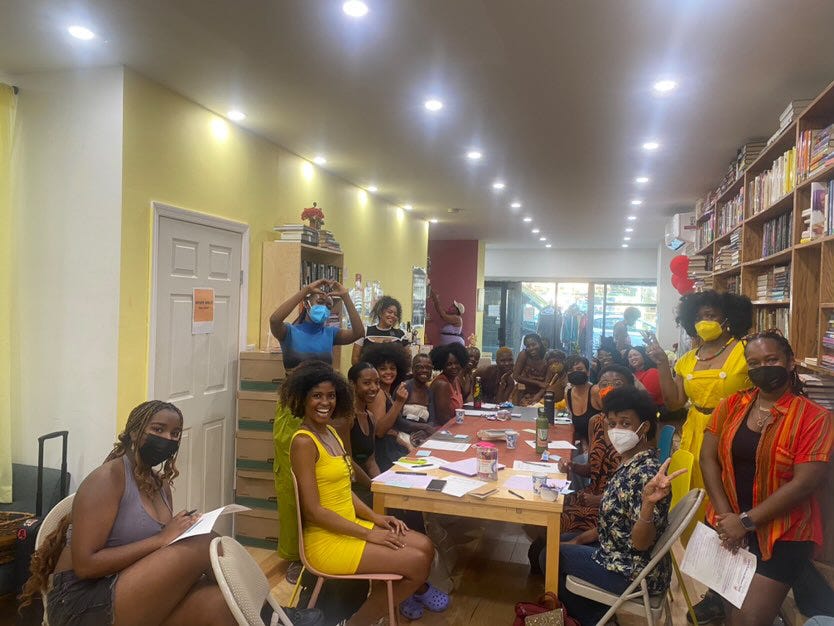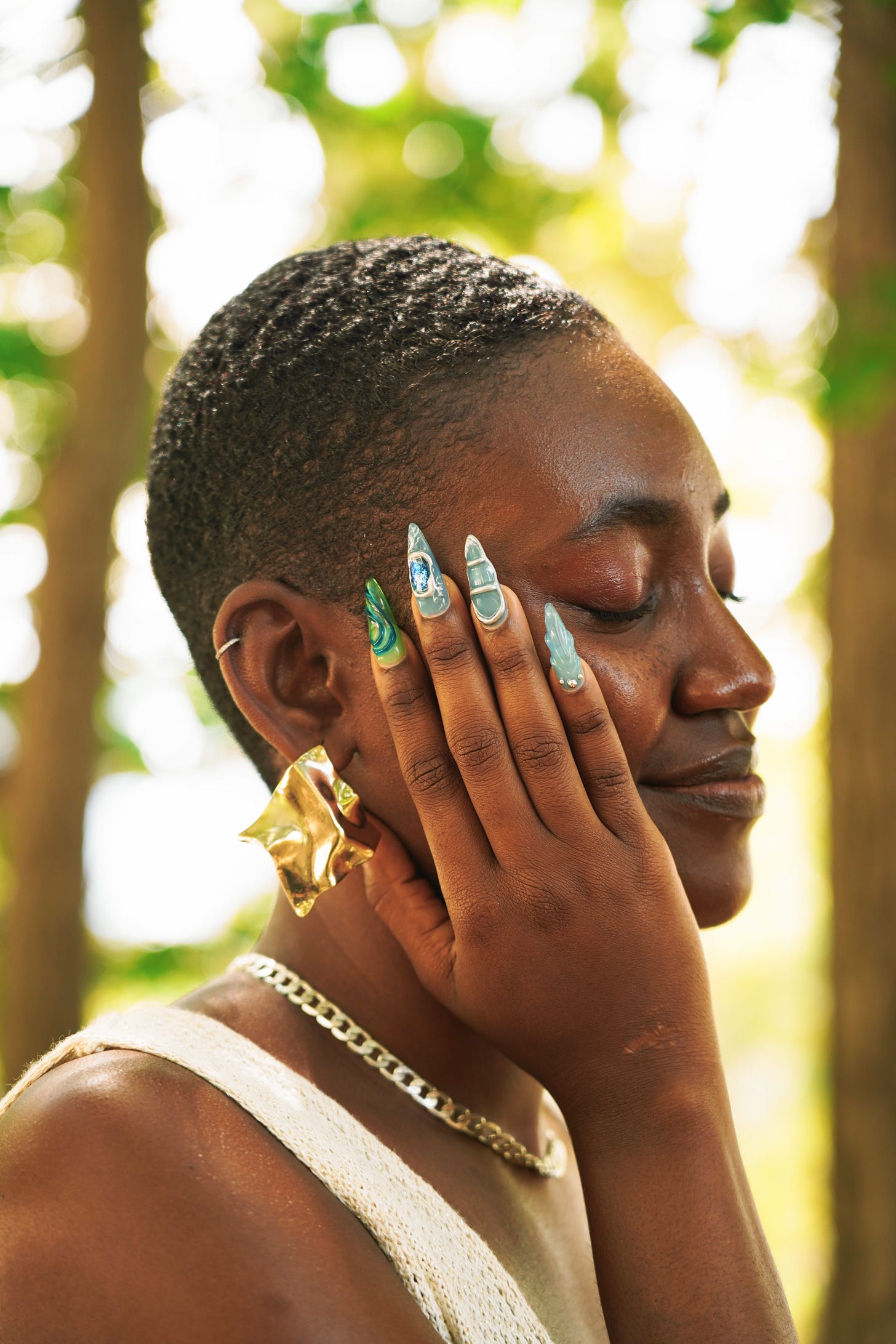Designing Care Futures Into Being
Reflecting on August’s Open Heart Clinic by Yaa Addae
Open Heart Clinic (OHC) is a community research incubator founded by artist-researcher Yaa Addae in Spring 2022 to hold space for conversations around structural barriers to care. Through workshops, lectures, exhibitions, and writing, OHC is creating a platform for envisioning alternative care infrastructures that center the systemically underloved- a mission described as ‘Restorative Love Economics’. Previous programming has happened in London, U.K at Somerset House, Queer Britain, UsTwo Studios, and Melanin Skate Gals and Pals. On August 6th The Free Black Women's Library hosted Care Futures Dream Tank, a speculative design workshop and the first NYC activation as part of Black August’s programming under ‘Liberation through Collective Care’.
Below is a reflection by the curator, Yaa.
At 19, Toni Cade Bambara turned my attention towards relationships as a foundation for worldmending. Her essay ‘On the Issue of Roles’ was the first time the argument for considering the personal as political had been so clearly laid out to me and as she carefully charted how the afterlives of slavery show up in gender dynamics today, her words lend my hand to trace the ruptures in my own family history, both interpersonal and systemic.
Remember that scene in Avengers: Infinity War where with a snap of his finger, Thanos disappears half of the human population from existence? (If not, here is a brief clip). In this fictional version of Earth, we see people all over the world slowly disintegrate while those who love them are left with memories and are forced to move forward in this post-apocalyptic reality.
Now imagine what psychic, spiritual, and emotional shifts would occur in response to over 100 million people around you being directly or indirectly lost over the course of 400 years, reducing the population of the continent by almost half. In 2019, I interviewed the now late former mayor of Accra, Ghana, and architectural historian, Nat Amartefeio as part of research I was doing on indigenous spatial design. “The buildings were built in such a way that it was difficult to get into and get out of unless you lived there to afford protection to residents. You entered and were in a compound - most of the huts were arranged around the compound. It was pretty difficult to know where you were in the structure if you were not familiar with the internal logic and you had come there to kidnap people in the middle of the night without making any noise,” he shared and in doing so, explained the intentionality behind the tightly clustered structures and narrow paths that seemingly go in circles that make up the neighborhood in Accra he was referring to. Although largely demolished to make way for new developments, this lingering spatial artifact is an example of how we wield design to meet our needs - design here referring to our ability to shape the world through intention.
We are all capable designers of our own lives, and as such have innate knowledge that is valuable for imagining structures that keep Black people alive, healthy, and loved. In Poetry Is Not A Luxury, Audre Lorde writes “Poetry is not only dream and vision; it is the skeleton architecture of our lives. It lays the foundations for a future of change, a bridge across our fears of what has never been before.”Language sets worlds into motion and so we will use conversation as the starting point for conjuring visions for the future.
Care Futures Dream Tank FAQ response to ‘Do I need to be a designer?’
This leads me to Sunday, August 6th, where 23 (!!) of us gathered, imagined, and began to lay the groundwork for other possibilities in response to the following prompts:
Caption:
What examples of community care have you experienced or witnessed?
Where did you learn to love? How?
Who is treated as deserving of care (interpersonal, systemic)? Why?
How do you take care of yourself?
Do you experience any barriers to caring for yourself or others? If yes, how so? If not, elaborate.
Imagine a future in which all Black people are healthy, loved, and kept alive. With words/drawings, show what this reality looks like. What do neighborhoods look like? What kind of services exist? How are schools set up? How has the world changed?]
We opened the session by paying respects to the lineage that informed our work through a visual research map with wide-ranging references from this iconic interview between Nikki Giovanni and James Baldwin to June Jordan, who through her architextural musings reminds us that the etymological root of poetry is poiesis, meaning to make. I facilitated this by piecing together a physical installation of Black writers (mainly from New York), major cultural events, and other source material to ground my growing framework of restorative love economics: how we redistribute love to the systemically underloved. It was also my first time using the Care Futures worksheet, which allowed for both personal reflection and a rich discussion where so much came up from the group including:
Interrogating how carcerality shows up in how we approach conflict with community and creates fear of punishment for mistakes
Looking to our first teachers of love - parents, elders, books, media, key relationships
Disentangling ourselves from early childhood experiences that taught love as conditional, codependent, stoic, achievement-based, material…the list goes on
Recognizing who is seen as deserving of basic care is often tied to who is seen as ‘useful’, and even then the care is towards ensuring that ‘usefulness’ is maintained so work can continue as opposed to healing. For example, healthcare primarily being provided through jobs or hostile architecture throughout the city that excludes rough sleepers to maintain a certain image.
The role of fear, vulnerability, not feeling deserving, and not knowing how to receive care freely
Capitalism as the antithesis to kinship: In this economic reality, the goal is to have enough money to be able to outsource care in the form of products/services (e.g. Ubers when it's late at night, a massage when in pain, nannies for support, etc). By emphasizing the individual, it does not encourage the conditions for caring systems to be created - but we try anyway.
Proximity as a barrier to community care. With increasing gentrification and people being pushed further and further into the outskirts, this can be felt in the impact on sustaining relationships in a meaningful way
We are our best in communion. Ola Ronke shared an anecdote of coming together with other families to create a cooperative preschool called Little Maroons that pointed to some of the ways that we could design care into our lives.
I was left feeling blessed to have been in a room of people who were so clearly able to articulate the lovelessness that pervades society and attempt to sketch out potential alternatives. My hope is that ultimately if we can recognize the ways in which care has been intentionally designed out of our lives and gravitate towards historical and contemporary instances of countering these restrictions, we can start to collectively organize restorative care infrastructures - bit by bit, wor(l)d by wor(l)d.
This portal was made possible thanks to:
-OlaRonke, for all the lifegiving work that they do with The Free Black Women's Library and the support of the brilliant Shy who helped with getting the space ready
-Kamalah Janan Rasheed’s suggestion to reach out to the library and feedback on my practice and potential directions that Open Heart Clinic could go in
-The generosity of Suhaly Bautista- Carolina of Moonmother apothecary, Laraib Ali of LooveHappy, and Arvolyn Hill of Goldfeather, for their donation of herbal care packages, stickers, and that lovely smelling incense.
-Caila Bowen, for encouraging me, the printing of materials, and donation of colorful N95 masks
-Everyone who showed up ready to listen and share - Thank you so so much for your contributions to this embodied research project.
To stay up to date with Open Heart Clinic + the growing framework of Restorative Love Economics, you can follow Yaa on Instagram @yaa.dae where she will soon be sharing her website.




Thank you for sharing this! My discovery of this peice comes on the heels of a conversation I had in a group chat with my sisters that has brought me to tears. We've all centered our jobs around care at some point and in some way. We are breaking generational curses by doing this even in our personal lives. I have been yearning for something (ironically) useful and yet inspiring and basically worthwhile to think about write about lately and this is it. This is IT.
“…Relationships as a foundation for worldmending” —ALL of THIS. Very inspiring.